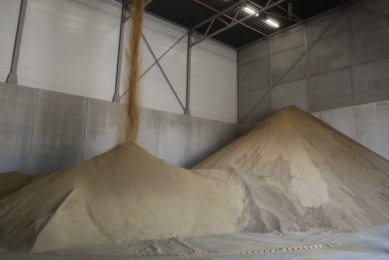US: Nutritional value of soy products in swine diets

Recent information released by the University of Illinois contains detailed nutritional information on eight different soy products and their value when fed to pigs.
Hans H. Stein, University of Illinois professor in the department of animal sciences, has released a new brochure, titled “Nutritional value of soy products fed to pigs.” The new brochure contains detailed nutritional information on eight different soy products, including full fat soybeans and conventional dehulled soybean meal as well as newer products such as fermented and enzyme-treated soybean meal.
“Soybean products are an important part of swine diets here in Illinois as well as most other parts of the world,” said Stein. “We wanted to provide producers with a source of data on all aspects of nutrition for a variety of soy products.”
Soybean meal is the most commonly used source of amino acids in diets for pigs around the world. The data in this brochure provides companies, swine producers, nutritionists and industry stakeholders with relevant information that will assist them in formulating soybean meal and other soy products into the diets for pigs. The brochure first describes the different soy products, how they are produced, and their applications in swine diets. The second section discusses the energy, carbohydrate, mineral, and protein and amino acid concentration of each product, as well as nutrient digestibility. Soybean meal is also compared with other plant protein sources with regards to amino acid digestibility and protein quality.
“Based on these comparisons, it is clear that soy protein has a balance of the essential amino acids that more closely fulfill the needs of pigs than any other protein source available,” said Stein. “The digestibility of these amino acids is also greater than in any other sources of plant protein, which further increases the value of soy protein compared with that of other plant proteins.” Key points include:
• Soybean meal is the premier source of digestible amino acids in diets fed to pigs.
• Dehulled soybean meal contains the same amount of digestible energy as corn.
• Fermentation or enzyme treatment of soybean meal eliminates the oligosaccharides in the meal, making them suitable for feeding to weanling pigs as a replacement for fish meal.
• Addition of microbial phytase will increase phosphorus digestibility in soybean meal and reduce or eliminate the need for supplementation of diets with phosphorus as well as reducing phosphorus run-off from manure into aquatic ecosystems.
“Diets that contain a source of cereal grains, soybean meal, and microbial phytase will satisfy the need for all amino acids, all the energy, and most of the phosphorus for growing and finishing pigs,” said Stein.
Bill Wykes, a soybean farmer from Yorkville, Ill., and former chairman of the Illinois Soybean Association, added, “We tend to think of soybeans as a source of amino acids first and foremost, but this work also shows that soybeans are a greater energy source than was previously believed. This resource will help producers take full advantage of the nutritional value of soybeans.”
“In Illinois, there are 4.6 million head of hogs, so pigs are the major consumer of soybean meal in Illinois, making hog farmers a top customer for Illinois soybeans,” according to Bridget Owen, associate director of the National Soybean Research Laboratory at the University of Illinois. “We value the research and data about soy and swine nutrition.”
“Nutritional value of soy products fed to pigs” can be downloaded here, or producers can contact their local Illinois Extension office for copies.
For more info, click here.











